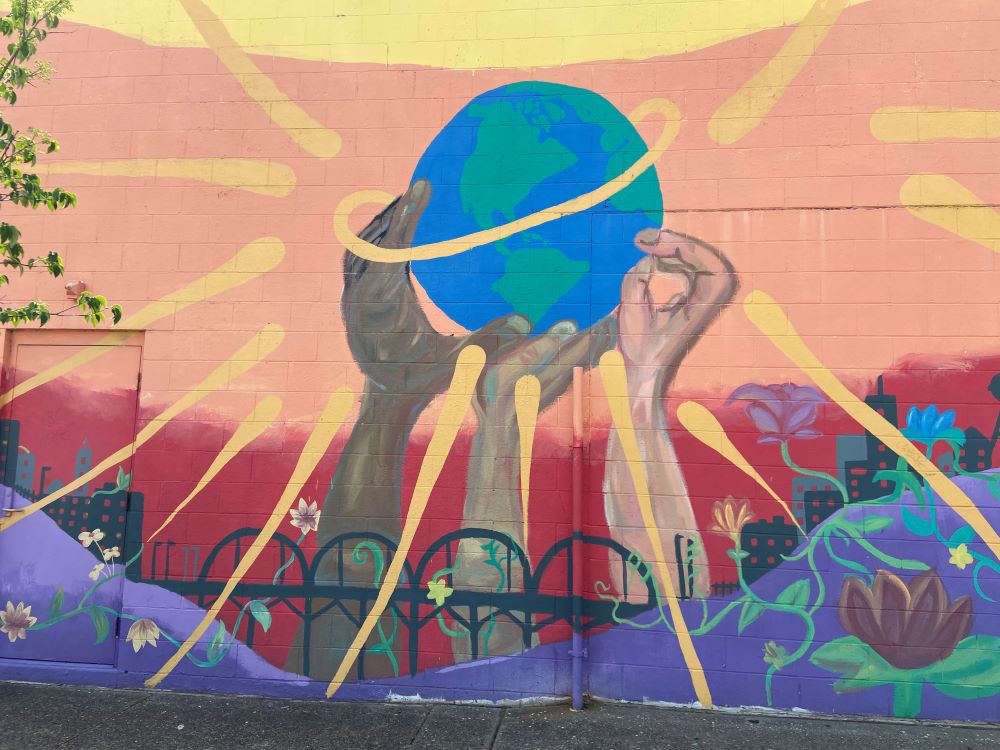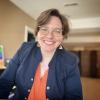
Street art in Louisville, Kentucky (Eilis McCulloh photo)
Like many people my age, I was inspired by and — dare I say — radicalized by Shane Claiborne and his book The Irresistible Revolution. Among the many stories he shares, I always remember the one in which Claiborne and his friends join forces with people experiencing homelessness to occupy a Catholic Church in Philadelphia. You see, these folks had called the church home and were now being evicted. As a 20-year-old just awakening to a world that included radical social justice heroes from our faith, I was ready to join Claiborne's movement and occupy the next church or move into the next intentional community he established. I was sure that this was the only way to respond to the Gospel that was suddenly alive to me.
Of course, I now know that our call to justice takes many forms depending on our location, the need and our ability. I have learned that what really matters is listening to that sense of urgency and call deep within us so that we can build an expansive and inclusive community so that we can authentically encounter one another and commit ourselves to personal and communal transformation.
During this season of Advent, we are invited to refocus that same energy and urgency as we prepare the way for Christ to become incarnate among us. How do we do that in a world torn apart by fear, brutal violence and war, crushing poverty and devastating climate change? Too often, it feels like all too much, and that for each step we take forward, we take five steps backward.
Martin Luther King Jr. offers us a good starting point. In his last Sunday sermon on March 31, 1968, he preached, "We are challenged to develop a world perspective. No individual can live alone. No nation can live alone. And anyone who feels that he can live alone is sleeping through a revolution. … The world in which we live is geographically one. The challenge we face today is to make it one in terms of [community]."
Advertisement
King reminds us that we are not called to be lone prophets saving the world on our own. Rather, we are called to inhabit a worldview that recognizes and acknowledges that each issue or event affects each and every one of us at some level. And our response adds to the revolution that will change the world.
In reflecting on this past year, our worldview and commitment to justice and community reminds us that:
- The tragic massacre at Club Q didn't affect just the people of Colorado Springs or the LGBTQ+ community. It affected all of us in different ways because we are all called to create spaces of welcome and safety wherever we are.
- The virulent antisemitism that has swept across the United States isn't only an attack on the Jewish community. It should be an affront to all of us and a reminder that we fail to live in solidarity with our Jewish siblings.
- Racism and white Christian nationalism affects each of us when we allow it to fester and widen division by choosing to remain silent.
- Since 2013, at least 54 school shootings have killed 101 people and injured 156, according to NBC News. These massacres affect not just students and teachers, but all of us. We cannot focus on gun control only when we are horrified by another mass shooting.
- Wars continue across the globe, including in Haiti, Yemen and Ukraine. If we call for peace in one country, we must demand peace in all countries.
- Anti-immigrant sentiment keeps the status of DACA — the Deferred Action for Childhood Arrivals policy — in limbo, drums up fear about a migrant crisis, and closes borders around the world.
We can no longer distance ourselves from an issue because we believe that it does not touch us directly. We cannot allow ourselves to fall into an "out of sight/out of mind" stance until we are jarred back to reality by the latest news report. The minute we begin to allow ourselves to believe that an issue doesn't affect us because we're not part of the targeted group, or don't live in the same geographic area, or any other reason — is the minute that we lose sight of the fervent prayers of Dr. King and the energy for change put into the universe by Claiborne and his friends.
We don't all need to occupy churches, lead marches or organize protests. What we do need is people willing to come together, to be open to transformation and to respond to the everyday call to see God in our midst. We need people who can call senators and representatives, email the White House, donate household items to newly arrived refugees and immigrants, welcome those arriving at our southern border and resettling in cities across the country, and offer prayers of solidarity. We need a transformation of heart and mind so that all we do unites us, raises awareness and prepares the way for our God.







